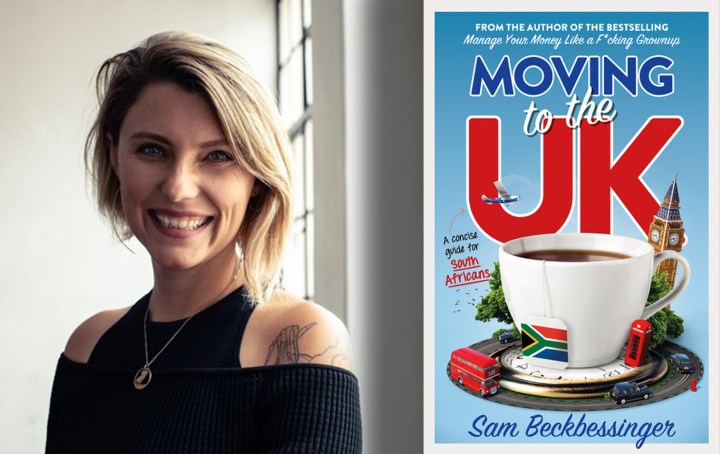BOOK EXTRACT
The big move: A guide for Saffers on easing into your new life in the UK

‘Moving to the UK: A Concise Guide for South Africans’, by bestselling local author Sam Beckbessinger, is for every Saffa looking to make the move across the pond.
In 2020, bestselling local author Sam Beckbessinger relocated to the UK and, now, her latest book breaks down how South Africans can make a similar move.
‘Moving to the UK: A Concise Guide for South Africans’ is an accessible guide, written in the same style that sold more than 50,000 copies of Beckbessinger’s ‘Manage Your Money Like A F*cking Grownup’. Complete with graphs, illustrations, humour and personal experiences, Beckbessinger has put all her knowledge into this book.
In this extract, she guides relocation hopefuls through searching for a UK-based job.
***
Find a job
Here’s the good news: there are many more jobs to go around in the UK than in South Africa, in almost all careers (with some exceptions, like veldskoen manufacturers, shisa nyama chefs and hippo wranglers).
Anecdotally, a lot of people use LinkedIn to find jobs in the UK, so start off by updating your LinkedIn profile. Once you’ve marked yourself as looking for jobs in the UK, recruiters may start contacting you.
You should also check relevant job-hunting sites, with a polished resume at the ready. And of course, let any professional contacts you have in the UK know that you’re on the hunt.
If you have decided that you need a skilled worker visa, there are job-hunting platforms that specifically allow you to search only for employers who are willing to sponsor international workers.
Once the offers start coming in, check out the employer’s rating on Glassdoor, a website that allows employees to rate their employers. This site will also give you an idea of the salary ranges for different jobs.
How to find a UK job
- Update your LinkedIn profile. Make sure that your profile is showing up to recruiters and letting them know you’re looking for work. Mention in your intro that you’re specifically looking for UK jobs. Spend some time making sure your profile’s as good as you can make it. If you pay for LinkedIn Premium, you can see who visits your profile and access more recruiters’ e-mail addresses.
- Refresh your resume. Resume.io is a pretty good tool that will help you figure out which sections you need. You can export a beautiful PDF CV for a small fee, or download the content in a text file for free that you can copy and paste into a word processing app. In my experience, references are less of a big deal in the UK than they are in South Africa, so don’t stress about them so much.
- Reach out to professional contacts, letting them know you’re job-hunting.
- Search for and apply to jobs on the job-hunting sites in the next section.
- Dazzle them with your brilliance!
- Review, negotiate, and then sign the contract.
Some stuff to note about UK contracts:
- Notice periods of three months or four months are not uncommon.
- Don’t be fooled by a lot of the ‘perks’ offered to you that are actually mandated by the government, like contributions to a pension fund and the ‘cycle to work’ scheme.
- Don’t be surprised by extensive background checks. They’re just like that here.
Job-hunting sites
- Reed: One of the biggest job-hunting sites, and they’re good for broad searches (but they don’t have an easy way for you to filter by visa sponsorship).
- The UK government’s job-hunting platform: A surprisingly great tool for finding diverse jobs, from entry-level barista positions to high-paid software engineering posts. There are special sub-sections for teachers and healthcare jobs.
- UK Hired: A niche job board for companies that offer visa sponsorship.
- Otta: A great job-hunting site specifically for people who work in tech.
- Hired: Flips things around – you create a profile, and potential employers apply to you (like Offerzen in South Africa).
- The Guardian Jobs: Great if you work in the media, arts, education or healthcare sectors.
- If You Could Jobs: For jobs in the creative industry.
Figure out where in the UK you want to live
This might be driven by where you find a job, but if you get to choose where to live in the UK, it’s worth exploring your options.
Non-London options
There’s more to the UK than London (a fact Londoners are prone to forgetting). The UK economy is more centralised than South Africa’s: Joburg contributes about 15% of South Africa’s GDP; London contributes about 23% of the UK’s.
Personally, some other places I’d consider living in the UK include:
- Edinburgh. An extremely cool city with friendly people and many ghosts.
- Bristol. It feels a lot like Cape Town, with worse weather but nicer people.
- Brighton. Full of gays and hipsters. Like Kalk Bay with a funfair, except the beach is made of pebbles.
- Oxford/Cambridge. Both have big academic and tech scenes. Oxford has better hiking; Cambridge has better links with London. I lived in Cambridge for my first two years in the UK. I liked it, but its ponciness annoyed me.
- Cardiff. A more affordable city, Wales is gorgeous, and the Welsh are the nicest people ever.
You could also embrace small-town cosy village life. There are quintessential villages on the Welsh border near Shropshire. Cornwall and Devon are both extremely charming and rugged, and not too cold.
There are lovely places in the Midlands with good access to hiking.
My all-time favourite village in the UK is Ely in Cambridgeshire (they have an annual eel festival).
I’ve heard good things about Birmingham, Liverpool and Manchester, but I haven’t been.
Check out the Sunday Times ‘Best Places to Live’ reports that come out every year for more inspiration.
You could consider living in a commuter town an hour or two outside London. You can get more space for your buck and they’re a decent solution for people who can mostly work from home but just need to come in occasionally for a meeting. It’s not worth it if you have to be in the office every day, though.
If you’ve got kids, a lot of this decision will be driven by where the good schools are.
Pros and cons of London
I live in London now, and I am entirely in love with it. It’s annoying and filthy and overpriced and impossible to live in. And … I’m in love with it. It’s that simple: you’ll either fall in love with it or you won’t. There’s no logic in love.
London is so large and so wild that it contains no less than everything – just as there will be irresolutions and ambiguities. But there will also be moments of revelation, when the city will be seen to harbour the secrets of the human world. – Peter Ackroyd
The only way to know if you should live in London is to try to spend a week here and see how it makes you feel.
London is a world city, in a way the rest of the UK is not. Thirty-seven per cent of Londoners weren’t born in the UK. In Glasgow, that’s only 18%. A common theme among most London newcomers I know is that few of us have made English friends. Instead, my new buddies are Indian, Russian, Australian, Kenyan, American, Brazilian, Turkish.
If you want to only hang out with South Africans, that’s also entirely possible, because you can’t throw a stone in London without hitting someone with a Saffa accent.
Bear in mind that if someone lives on the other side of London to you, it’s a long-distance relationship. You will never see them.
Special considerations if you’re queer or black
The good news is that most of the UK is refreshingly LGB-friendly, even the small towns. The bad news is that some places are very hostile towards trans, non-binary and gender-non-conforming people, and unjustified panic about trans people is being used to stoke up a stupid culture war right now, at the expense of trans lives. Gender-affirming healthcare and social support are underfunded and overwhelmed, and hate crimes against trans people have increased.
If you’re queer, you’ll probably feel most comfortable in London (try Hackney, Waltham Forest, Camden, or Lambeth), Brighton, Manchester, Glasgow, or Bristol.
I’m not qualified to report on whether the UK feels more or less racist than South Africa. Structural racism – as evidenced by employment and income figures – certainly isn’t as extreme as it is back home, but that’s a low bar.
Sadly, I can assure you that racism exists, even in the big cities. It’s been an upsetting experience to observe the number of microaggressions my partner’s dad experiences here. He’s Greek and dark-skinned. In South Africa, he was usually assumed to be white, but in London people normally read him as Middle Eastern. Last week, he popped around to our flat and was helping us figure out our water meter when our neighbour started aggressively interrogating him for ‘suspiciously lurking around our property’. Shit like this happens all the time, and it sucks.
If you’re Black or ethnically Asian, really consider one of the big cities. Almost half of Londoners are people of colour, so you won’t be a minority.
Live where your friends are
My biggest suggestion for you: if you have any friends or family already in the UK, just move as close to them as possible. It’s so much easier to meet people if you have even one foothold in a community. And those first few months can be really lonely; it will be so much easier if you have a support system from the beginning. I’d weigh having friends nearby above almost any other consideration about where to live. DM















 Become an Insider
Become an Insider
We lived in the UK for sixteen years and have been back for nine. Oos, wes – tuis bes. (If you’re a pensioner).
Can’t believe the audacity of this person. She makes a duck to the UK and then makes money writing a book luring South Africans away from their country. If you make the chicken-run to the UK, you become part of that country. Leave us alone and start practicing the words of your new anthem. Or join all those phony expats in their silly green shirts and shed crocodile tears about biltong, braaivleis and Mrs Ball’s chutney.
I’m all in favour of these books with useful information from “how to declutter your home, organise your finances, guide to camping and settling in another country.”
No need to get steamed up or personal. Its a fact of life. People move for various different reasons……………..